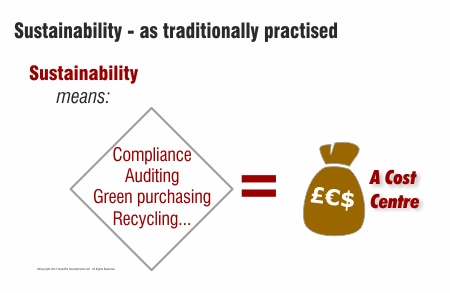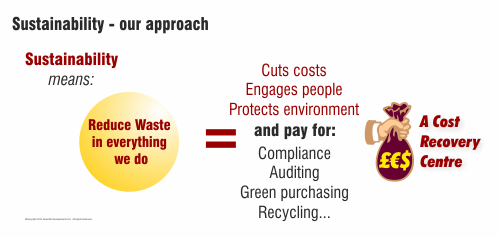sustainability
Sustainability is the new "black" - it is the fashion statement de rigeur for organisations. It has become a corporate prerequisite for all kinds of reasons from a genuine belief in the need for sustainability to "greenwash". Furthermore, much of sustainability is backed by legislation in lots of countries and so it is not just a fashion statement but also an elephant in the room that you cannot ignore.
 But what to do? Sustainability, when practised conventionally, is a cost centre. Think about it: compliance to legislation, data gathering and auditing... all this costs money and there is also the salaries of the sustainability and environment managers and their mobile phones. Ah, but there is recycling. It helps the world and makes everyone feel good. Recycling is actually an even bigger cost centre: you pay for stuff you do not use or need, then you spend time sorting it into suitable piles, and then pay someone to take it away. It doesn't make a lot of sense when you look at it this way. Sure, we can't always reuse everything like packaging, but recycling is not necessarily the panacea that suppliers and waste companies tell us. Wait, aren't these the same people who sell us the stuff in the first place and the people we pay to take it away afterwards? No wonder they are so keen on recycling.
But what to do? Sustainability, when practised conventionally, is a cost centre. Think about it: compliance to legislation, data gathering and auditing... all this costs money and there is also the salaries of the sustainability and environment managers and their mobile phones. Ah, but there is recycling. It helps the world and makes everyone feel good. Recycling is actually an even bigger cost centre: you pay for stuff you do not use or need, then you spend time sorting it into suitable piles, and then pay someone to take it away. It doesn't make a lot of sense when you look at it this way. Sure, we can't always reuse everything like packaging, but recycling is not necessarily the panacea that suppliers and waste companies tell us. Wait, aren't these the same people who sell us the stuff in the first place and the people we pay to take it away afterwards? No wonder they are so keen on recycling.
So what to do then? How about cutting waste? By reducing wastage, we save on materials, time, resources and reduce our costs. Suddenly sustainability not only help us do good but also help us recover cash currently lost in our processes. Waste reduction engages everyone at work in thinking up better ways to do things and that brings innovations. Waste reduction means less stuff being ordered and thrown away (sorry, suppliers and waste companies) and therefore reduces the burden on our planet. We are "doing" sustainability by cutting waste - what's not to like?
 Waste reduction engages everyone at work and allows everyone to contribute to making sustainability happen. But we do not need new "green" skills for every job (that's something that training providers want to push on us and it costs money). Instead what we need is Green Capabilities: a knowledge of the legal requirements, our common sense, some guidance and using our current skills. It is also not expensive, because it is what we are already doing, but to do it better.
Waste reduction engages everyone at work and allows everyone to contribute to making sustainability happen. But we do not need new "green" skills for every job (that's something that training providers want to push on us and it costs money). Instead what we need is Green Capabilities: a knowledge of the legal requirements, our common sense, some guidance and using our current skills. It is also not expensive, because it is what we are already doing, but to do it better.
Innovation is an outcome when we reduce waste, we think of better, more effective and more efficient ways of working. It is also a source of competitive advantage for our organisation. To keep the streams of innovations and improvements coming, we will need to have a framework where ideas for improvement are respected, recognised and rewarded.
Coupled these three areas with a communications framework which provides information and encouragement, we can readily sustain the sustainability initiative in our projects and programmes.
